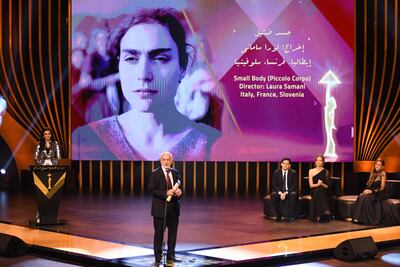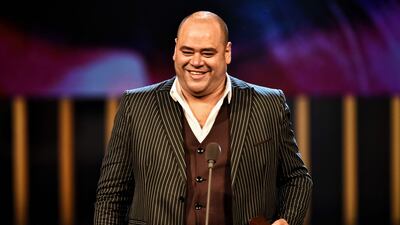There was a real global flavour to the awards handed out at the closing ceremony of the Cairo International Film Festival on Sunday night.
The Cairo International Film Festival, currently the only festival in the Middle East classed as a “Category A” event by the International Federation of Film Producers Associations, has concluded with the presentation of its top prize, the Golden Pyramid for Best Film, to Mexican director Joaquin del Paso’s coming-of-age drama, The Hole in the Fence.
The Mexico/Poland co-production follows the trials of a group of private school pupils taking part in an exclusive summer camp. The film originally premiered at Venice, where it picked up the the Bisato d’Oro for Best Cinematography.
Italian director Laura Samani took The Silver Pyramid for her period drama Small Body, the moving story of a woman dealing with the trauma of her infant's death in 19th century Italy. Another multinational production – this time an Italian-Slovenian-French joint effort – Small Body debuted at Cannes in May and had previously picked up festival awards in both London and Seville.
There was a second Italian appearance among the top prize winners, as Swamy Rotolo nabbed the Best Award for her performance in Jonas Carpignano’s A Chiara, the tale of a young woman who discovers that her close-knit family has ties to organised crime.

The Bronze Pyramid Award, which is handed to the director presenting the best first or second film at Cairo, saw South Korea continue its impressive recent takeover of our screens. Hong Seong-eun’s Aloners had already picked up awards for lead actress Gong Seung-yeon in Torino and Seoul ahead of this success for the director in Cairo.
The jury kept things close to home for the Best Actor Award, handing the prize to Kuwait-born Egyptian actor Mohamed Mamdouh for his role in Nadine Khan’s Abu Saddam. Mamdouh is probably best-known for his role as Dr Sameh in the 2014 hit Blue Elephant, and Abu Saddam marks his debut lead role as the title character, a truck driver with anger issues.
The prize for Best Arab Film across the festival’s three competitions went to the Syrian-Palestinian-German co-production The Stranger. The emotional drama, which is also Palestine’s nomination for the next International Feature Oscar, is set in the occupied Golan Heights. Directed by Ameer Fakher Eldin, the film also picked up the Shadi Abdel Salam Award for best film in the International Critics’ Week Competition section.
The second Critics’ Week prize – the Fathy Farag Special Jury Award – went to Hungarian director Hajni Kis for her feature debut, the family drama, Wild Roots.
Top honours in the festival’s Horizons of Arab Cinema Competition Awards went to Joana Hadjithomas and Khalil Joreige’s Lebanese/French co-production Memory Box, which had previously been nominated for a prestigious Golden Bear at the Berlin Film Festival.
A second Lebanese film, Nicolas Khoury’s intimate, autobiographical Fiasco, landed the Salah Abu Seif Special Jury Award in the Horizons section, while Hala Galal’s documentary From Cairo took the Horizons Best Non-Fiction Film Award.
Zaid Abu Hamdan’s Jordanian black comedy Daughters of Abdel Rahman picked up the Audience Award under the Best Arab Film Award, and Afef Ben Mahmoud picked up the Best Acting Performance Award in The Horizons of Arab Cinema Competition Award for her role in the Tunisian drama Streams.

